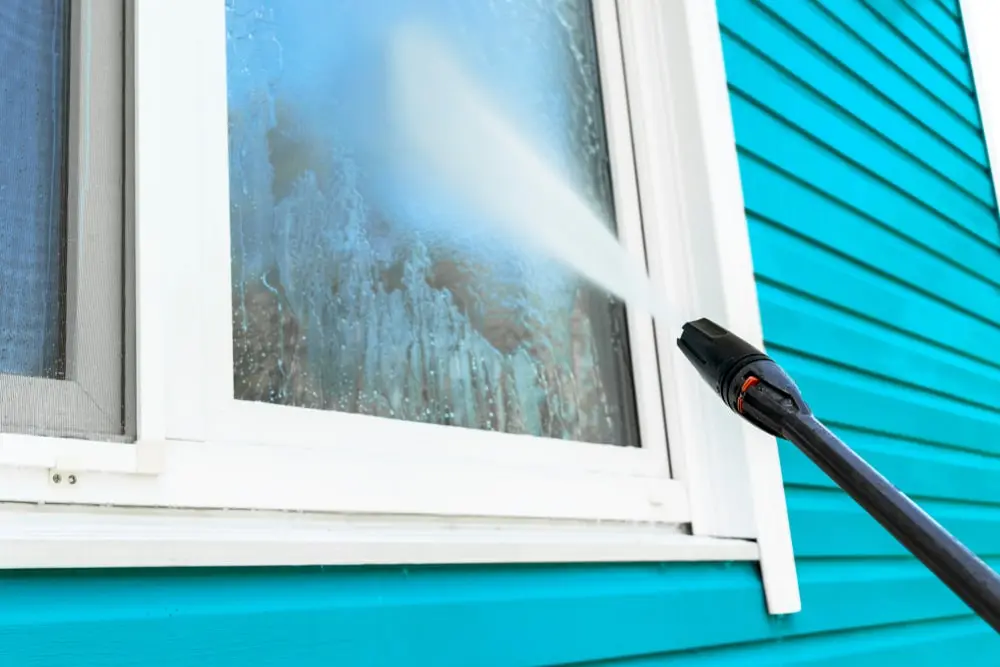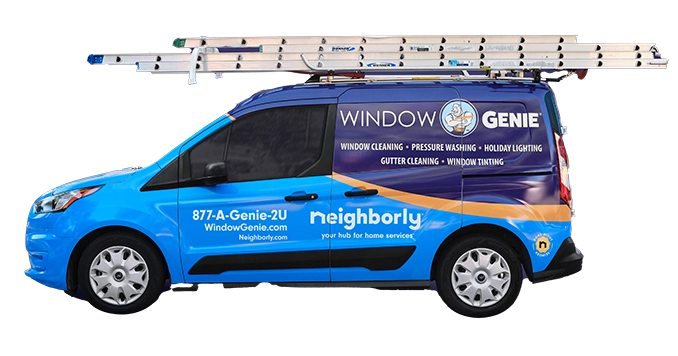
The primary difference between power washing and pressure washing is the water temperature. Pressure washing is typically done with tap water with no heating element, while power washing requires heated water to clean surfaces.
While many refer to pressure and power washing interchangeably, power washing generally refers to high-pressure, heated water. While both methods blast away grime, dirt, and other contaminants from outdoor surfaces, power washing can damage delicate surfaces.
Of the two, pressure washing is less likely to harm delicate parts of a house’s exterior. Pressure washing thoroughly cleans your home’s exterior and eradicates grime, mildew, and more while minimizing the chances of damage. Pressure washing is generally less abrasive than power washing, which is why most homeowners and professional services favor pressure washing over power washing.
Window Genie doesn’t need heated water for our pressure washing services. We train our Window Genie service professionals extensively to wash every facet of your home with the perfect amount of pressure to guarantee optimal cleaning with no damage! Learn more about these two cleaning methods below.
The Benefits of Pressure Washing
- Pressure washing prevents damage caused by grime and other debris building up on your exterior surfaces, like your pavers, your house, and your driveways. Pressure washing is also gentle enough to keep everything in top shape.
- Clean exteriors boost your home’s curb appeal and increase the value overall, benefiting you in the long run.
- Save time and energy with pressure washing services – no need to scrub everything by hand when professionals can apply pressurized water with a delicate touch that protects your belongings.
- Pressure washing can unclog your gutters, revitalize your tile and grout, and prevent mildew buildup.
Pressure Washing: A Closer Look
Pressure washing is a cleaning technique that utilizes pressurized water to remove dirt, grime, mildew, and other stubborn stains from various surfaces. It is a popular method for cleaning outdoor areas such as driveways, sidewalks, decks, and exterior walls. The process involves using specialized equipment that generates high-pressure water streams, effectively cleaning and restoring surfaces.
One of the advantages of pressure washing is its ability to provide efficient and thorough cleaning. The high-pressure water stream can reach deep into porous surfaces and crevices and effectively remove dirt and contaminants. Additionally, pressure washing can save time and effort compared to traditional cleaning methods, as the forceful water stream can quickly and effectively dislodge stubborn stains.
However, there are a few things to consider before pressure washing. The high pressure used in the process can potentially cause damage to delicate surfaces or deteriorate certain materials if not used properly. It is essential to adjust the pressure settings and choose the appropriate cleaning method based on the surface. Additionally, the solutions in pressure washing may raise environmental concerns, making it imperative to follow proper disposal practices and consider eco-friendly alternatives whenever possible.
Avoid these issues by hiring experienced professional pressure washers like Window Genie. Our team is uniquely qualified to provide gentle, thorough cleaning to your surfaces. Our two pressure levels available are outlined below:
Soft Washing
There are two types of pressure washing: soft washing and high-pressure washing. Soft washing employs lower water pressure with a solution to gently clean delicate surfaces, such as roofs, painted surfaces, and certain types of siding. Soft washing is ideal for preventing damage to delicate surfaces that may be sensitive to high pressure.
Soft pressure washing typically uses a biodegradable solution that removes the biological elements and stains without damaging the surfaces of your home or business. This method can remove elements such as algae, pollen, and dirt without damaging your garden.
Soft washing is ideal for cleaning sensitive surfaces such as:
- Windows
- Roof shingles
- Screens
- Wood paneling
High-Pressure Washing
On the other hand, high-pressure washing uses powerful water jets to remove tough stains and grime from more durable surfaces like concrete, brick, and metal. High-pressure washing can tackle deep-rooted dirt and stains that lower pressures may be incapable of removing. This type of pressure washing is commonly used for heavy-duty cleaning tasks and can significantly improve the appearance of heavily soiled surfaces.
High-pressure washing is the standard type of cleaning for many applications and outdoor surfaces. It can remove loose paint, mud, and dirt from surfaces such as buildings, vehicles, and concrete. While this method is effective at removing dirt and grime from a variety of surfaces, it is not ideal for more delicate items.
High-pressure washing is ideal for cleaning surfaces such as:
- Concrete driveways
- Sidewalks
- Decks
Key Differences Between Power Washing and Pressure Washing
Power washing and pressure washing are two distinct methods of cleaning that differ in terms of the temperature and pressure level of the water used, the surfaces they can effectively clean, and the cost and availability of equipment.
The primary difference between power washing and pressure washing lies in the temperature of the water. Pressure washing typically uses unheated tap water and relies solely on the force of the water stream for cleaning.
In contrast, power washing pressurizes hot water to remove stubborn dirt and grime. While the heating element in power washing can be advantageous for removing tough stains, it can also pose a risk to delicate exteriors that may be heat-sensitive. This is why most people opt for pressure washing; it is often the safer choice to avoid potential damage caused by the higher temperature of the water.
When it comes to the surfaces that each method can effectively clean, pressure washing is the ideal choice for various home applications. Pressure washing is less likely to cause damage to weaker outside elements such as screens, making it suitable for cleaning windows, patio furniture, vinyl siding, and other delicate surfaces.
Pressure washing is also well-suited for cleaning materials like brick, concrete, and masonry that can be vulnerable to damage. The forceful water stream can effectively remove dirt, algae, and other deposits from these surfaces without causing harm.
Conclusion
Understanding the differences between power washing and pressure washing is crucial for making an informed decision on what to clean your home or business with. While power washing with hot water can be effective for tough stains, it carries a higher risk of damage to heat-sensitive exteriors.
On the other hand, pressure washing with unheated tap water provides a safer option for most applications, making it ideal for home cleaning needs. Pressure washing offers versatility in cleaning delicate surfaces like screens and materials like brick and concrete. With its efficiency and accessibility, pressure washing is a practical choice for homeowners and small-scale projects.
If you need professional pressure washing services, look no further than Window Genie’s Pressure Washing. Our expertise and state-of-the-art equipment ensure thorough and safe cleaning, leaving your surfaces looking like new. Transform your outdoor spaces and restore the beauty of your home by experiencing the benefits of professional pressure washing.
Request a quote today and witness the noticeable difference we can make in your cleaning routine!
